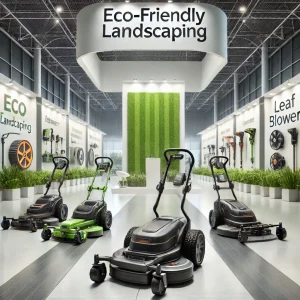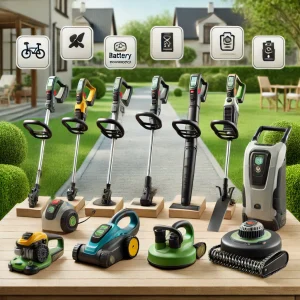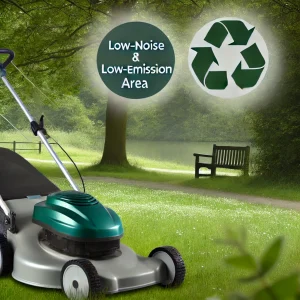The Equip Exposition has once again set the stage for innovative transformations in the landscaping industry, showcasing cutting-edge smart tools designed to boost efficiency and minimize environmental impact. This year, the focus has been on equipment, prioritizing automation, battery power, and eco-friendly design—a trend gaining traction among landscapers in British Columbia and beyond. The latest innovations, from automated mowers to battery-operated lawn care equipment, reflect an industry increasingly committed to sustainable, high-efficiency solutions.

Automated Mowers: Setting New Standards in Efficiency
One of the highlights of this year’s Equip Exposition was the expansion of automated mowers. These machines, designed for precision and efficiency, have already gained popularity in urban and suburban spaces across British Columbia, where consistent lawn maintenance can be challenging. Models like the Husqvarna Automower and Robomow offer remote operation and autonomous cutting capabilities that can handle even the most complex landscapes. For commercial landscapers, the time-saving benefits are undeniable, freeing up crews for more intricate tasks while automated mowers handle large lawn areas.
Comparison with Previous Years: Earlier versions of automated mowers required significant human intervention, often needing manual recharging or troubleshooting. The latest models, however, come equipped with smart sensors, GPS navigation, and solar charging capabilities, allowing them to cover larger areas autonomously while reducing energy costs. This evolution means British Columbia’s landscapers can now manage large commercial spaces efficiently while reducing emissions and noise pollution.

Battery-Powered Lawn Care Equipment: Prioritizing Eco-Friendly Operation
Battery-powered tools have significantly impacted this year’s Equip Exposition, standing out as viable alternatives to traditional gas-powered equipment. Tools like STIHL’s battery-powered trimmers and EGO’s electric leaf blowers not only reduce emissions but also offer quieter operation, a feature highly valued in British Columbia’s residential neighbourhoods and parks, where noise restrictions are enforced.
Battery technology has also improved recently, with lithium-ion batteries providing longer run times and faster recharging. This advancement has minimized downtime, allowing landscapers to work more efficiently without sacrificing power. Furthermore, brands like Greenworks Commercial and DeWalt have introduced multi-tool battery systems that can be swapped between equipment, making them a cost-effective investment for small businesses looking to expand their toolsets.
Cost-Effectiveness and Long-Term Benefits: While battery-powered tools require an upfront investment, their long-term cost savings are substantial. By reducing fuel consumption and maintenance associated with gas-powered tools, landscapers save money while contributing to a cleaner environment—a win-win for eco-conscious clients in British Columbia.

Eco-Friendly Features: Lower Emissions and Noise Control
Landscaping professionals increasingly turn to tools that help minimize their environmental footprint, a priority in eco-sensitive regions like British Columbia. Many tools showcased at the Equip Exposition include low-noise and low-emission features that support quieter and cleaner operations. Electric mowers and trimmers, for instance, emit no exhaust, making them ideal for parks, residential areas, and even commercial zones where environmental standards are prioritized.
This year’s lineup included Makita’s Quiet Series mowers and Toro’s 60V Flex-Force power system designed to work efficiently without disturbing local wildlife or residents. In areas like Victoria or Vancouver, where noise and air pollution are major concerns, these tools offer an appealing solution for sustainable landscaping.
Regional Application: British Columbia’s diverse terrain and urban layout require landscapers to adapt to high-traffic commercial zones and quiet residential spaces. By adopting low-emission and low-noise equipment, landscapers can service a variety of settings without contributing to noise or air pollution, aligning with provincial sustainability goals.

Smart Technology Integration: Precision and Performance
Another trend from the Equip Exposition is integrating smart technology into landscaping tools. With advancements in IoT (Internet of Things), landscapers can now connect and control multiple tools from a single device, receiving real-time updates on maintenance schedules, battery life, and even tool performance. For instance, John Deere’s advanced GPS-integrated mowers allow landscapers to track and optimize mowing routes, ensuring complete coverage with minimal overlap.
Future-Proofing Landscaping Operations: For British Columbia landscapers, adopting smart technology can translate to more predictable maintenance schedules, increased job site efficiency, and fewer resource-intensive tasks. This technology saves time and reduces waste, making it an attractive option for commercial landscapers working with large-scale clients.

Key Takeaways and Recommendations for BC Landscapers
British Columbia’s landscapers have much to gain from the innovations showcased at the Equip Exposition. The trend toward smart, eco-friendly tools reflects a growing demand for sustainable solutions that reduce both environmental impact and operational costs. For landscapers in urban areas, the quieter and emission-free operation of battery-powered tools offers an opportunity to maintain green spaces without disturbing local communities. Meanwhile, automated mowers and smart-integrated equipment are setting new standards in efficiency, allowing landscaping teams to optimize their workload effectively.

As these tools continue to evolve, adopting the latest innovations can offer significant long-term benefits. Landscapers investing in this new generation of equipment will not only enhance their service quality but also position themselves as leaders in sustainable landscaping, a reputation that resonates strongly with eco-conscious clients and environmentally regulated regions across British Columbia.